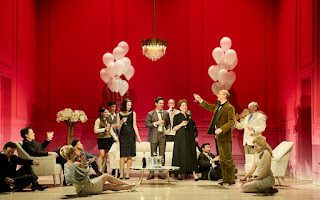Burton has always admired Gielgud, but his hiring him to direct him in the play may be more because he knows the older actor needs the work, than because he thinks he's the best man for the job.
The production's conceit will be that it's semi-staged, as if the audience were watching a run-through late in the rehearsal period. By the time the company is assembled in the actual rehearsal room, Burton and Gielgud would already have given you a different answer as to whose idea the staging was, and that blurring of who's in charge of the process becomes an increasingly fractious theme. Though there's never any doubt that the two men's underlying mutual respect is real, things get very tense very quickly.
The two have a war of words that includes Burton turning up to a rehearsal steaming drunk and doing a cruel impression of Gielgud; whereas Gielgud's most savage attack is a clinically sharp puncturing of an anecdote about Laurence Olivier that Burton's been charming the cast with. They know how to hit each other where it hurts, in Gielgud's insecurities and Burton's need for popularity. The cast, including Janie Dee's Eileen/Gertrude are caught in the middle; I don't know it's all the Hume Cronyn and Jessica Tandy films I watched growing up, but I found something incredibly heartwarming about the play's affectionate take on Cronyn (Allan Corduner) as peacemaker.
Ultimately the uniting force will be Taylor, with the combination of her knowledge of Burton, and her outsider's view - as someone who sees herself exclusively as a screen actress - of the way the men are drawn to the theatre. And this is why it's perhaps inevitable that this show would have a lot for me to love, as it's theatre about theatre, and very much about Hamlet - I'm always drawn back to it because of the seemingly infinite ways it can be rediscovered and recreated around new actors, and that's part of what Thorne is fascinated with in this play as well: The Motive and the Cue's central dilemma is what exactly will make Burton's Hamlet his, and the moment he and his director discover it is electric (although it's so perfectly tailored to my interests I did wonder how many more casual theatregoers would find it self-indulgent.)
But it's also interesting to see the ways the process breaks down. When things are going badly, Gielgud manages to be a disastrous director in completely opposite ways: The only way he can direct Burton is by trying to impose his own line readings on him, but when William Redfield (Luke Norris) begs for help with his Guildenstern, what he gets is vague and contradictory.
I thought Gielgud's chaste encounter with a rent boy (Laurence Ubong Williams) who ends up being more of a therapist to him was a bit of a cliché, and on a stage that's become known for its spectacular scene changes, Es Devlin's design keeping all the big set changes behind the curtain seemed like a missed opportunity in a play that revels in theatricality. But overall this is a very satisfying evening that delves into the challenges and contradictions of putting Hamlet on stage in an entertaining way. And if it is a bit self-congratulatory about the power of theatre, that's not necessarily a bad thing at a time when the very value and purpose of the arts have been attacked and undermined for years.
The Motive and the Cue by Jack Thorne is booking until the 15th of July at the National Theatre's Lyttelton.
Running time: 2 hours 50 minutes including interval.
Photo credit: Mark Douet.






No comments:
Post a Comment